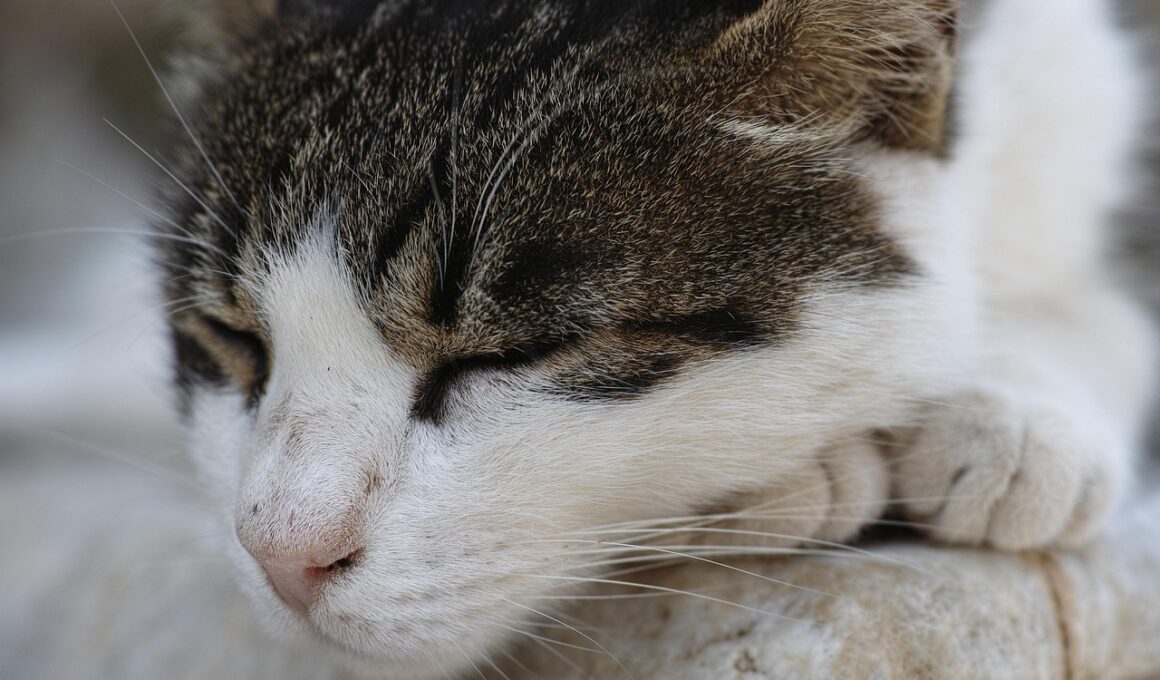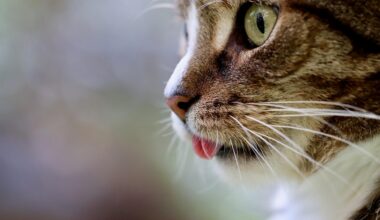How Proper Sleep Promotes Cat Mental Health and Stress Prevention
Proper sleep plays a crucial role in enhancing the mental well-being of cats. Just like humans, cats require adequate sleep to rejuvenate both their minds and bodies. A well-rested cat is typically more playful, engaged, and emotionally stable. If a cat experiences disturbed sleep patterns or insufficient rest, it can lead to stress, anxiety, and behavioral issues. Creating a comfortable sleeping environment is essential for a cat’s overall health. Cats are natural hunters, often preferring quiet corners, soft bedding, and minimal disturbances. Assessing their sleeping habits can provide insights into their emotional state. Additionally, cats may exhibit signs of stress or discomfort if they’re unable to sleep peacefully. This can manifest as aggression or over-grooming. Identifying stress triggers and adjusting the surroundings can be helpful. Regular sleep contributes significantly to cognitive functions, enhancing memory and learning capabilities. Establishing a predictable sleep routine also supports mental health in cats. This includes setting designated sleeping zones, avoiding loud noises, and providing cozy spots. By fostering these practices, you improve not just their sleep but their overall quality of life.
Understanding the correlation between sleep and stress management in cats extends beyond mere convenience. In essence, adequate sleep serves as a preventive measure against various stress-related disorders. For instance, clinical studies indicate that cats deprived of quality sleep often demonstrate increased signs of stress, leading to health complications. Behaviors like hiding or excessive meowing may signal that a cat is struggling to cope with anxiety. Thus, ensuring a peaceful sleep environment is paramount. Furthermore, active play sessions during the day can help cats expend energy, setting the stage for better sleep at night. Interactive toys or playtime with owners can stimulate a cat’s hunting instinct, making them more likely to rest soundly. Reassessing routines to include these activities can significantly help. It’s also crucial to be mindful of a cat’s sleeping position and frequency. Cats that curl up comfortably tend to feel more secure. If a cat constantly changes positions or seems restless, this may indicate a lack of comfort or security. Addressing these concerns is vital for their mental health. Owners should remain observant of any changes in their cats’ behavior, particularly around sleep habits, as these could be signs of underlying issues.
Creating a stable environment for a cat can maximize the benefits of sleep on their mental health. A chaotic home environment can lead to increased stress for any animal. Cats thrive in predictable settings where they can establish routines. Therefore, owners should strive for consistency in feeding times, play schedules, and quiet periods. Incorporating familiar items like favorite blankets or toys in their sleeping areas makes them feel secure. An environment rich in stimulating activities helps in reducing anxiety. Interactive play improves a cat’s mood, promoting healthier sleep. Integrating scratching posts or climbing spaces can boost their physical and mental engagement. Moreover, ensuring proper nutrition is equally vital, as a balanced diet supports overall wellbeing and sleep quality. The comfort of a cat’s sleeping area is fundamental. Providing choices between various sleeping spots can encourage them to find their preferred place. The use of pheromone diffusers may also contribute positively, lessening anxiety levels and facilitating better sleep quality. Regular vet check-ups play a critical role as well. Health problems such as pain or discomfort can interfere with sleep patterns, thereby impacting mental health negatively. Ultimately, the right sleep strategies contribute to a happier and healthier cat.
The Importance of Sleep Cycles in Cats
Recognizing the complexities of a cat’s sleep cycles is crucial in understanding their mental health. Cats experience various stages of sleep, including REM (Rapid Eye Movement) sleep, crucial for cognitive functions. During REM, cats dream, which may help them process experiences and emotions. A single cycle of sleep can last up to approximately 90 minutes, and cats typically sleep for 12-16 hours a day, divided into multiple sessions. If a cat’s sleep is frequently interrupted, they may miss the benefits of these vital cycles. It’s essential to create a peaceful setting devoid of loud noises, sudden movements, or changes in lighting. A good quality bed placed in a quiet area can foster undisturbed sleep. This will allow them to go through multiple refresh cycles. Additionally, understanding a cat’s natural instincts can enhance their sleep. For example, creating spaces that resemble hideaways can mimic their natural habitat. This approach caters to their instincts, promoting an environment that encourages relaxation. Offering spots elevated from ground level can also boost their sense of safety, allowing them to enter a deep sleep state more readily. Additionally, ensuring a sleeping space that reflects their preference can significantly deter behavioral problems.
Behavioral changes in cats leading to disrupted sleep patterns frequently hinge on aspects of their environment. Cats are sensitive to changes in their surroundings, so introducing new pets, family members, or furniture can trigger stress. This stress directly impacts their ability to sleep undisturbed, potentially resulting in anxiety-related behaviors. For example, a cat may start displaying aggression or compulsive grooming due to feeling insecure. Therefore, gradual introductions and maintaining routines can be beneficial. If a cat consistently displays disruptions in their sleep, it may be worth investigating external factors impacting their space. Furthermore, engaging with them positively throughout the day could alleviate stress, enhancing their sleeping patterns. Elements such as proper temperature regulation can also significantly affect sleep. Cats prefer warm spaces but may avoid overly hot areas. Additionally, using soft bedding materials can convert any ordinary sleeping spot into a sanctuary for them. Avoiding abrupt changes in environment or routine, especially during significant events, will allow them to remain at ease. Observing your cat’s unique preferences and observing daily changes can significantly contribute to promoting better sleep and, consequently, improved mental health outcomes.
Impact of Diet on Cat Sleep Quality
The quality of a cat’s life is often connected to their diet, which can affect sleep patterns and overall mental health. A balanced diet featuring a mix of proteins, fatty acids, and fiber can significantly contribute to your cat’s sleeping habits. Certain nutrients are well-known for promoting better sleep. For example, foods high in tryptophan can appear beneficial. Tryptophan is an amino acid that promotes the production of serotonin, which aids relaxation and sleep. Moreover, ensuring meals are served at consistent times adds to the predictability that cats thrive on, which supports overall wellbeing. It allows their bodies to align with external cues. As with humans, hydration is also vital; if a cat is dehydrated, their sleep can be adversely affected. Creating a feeding schedule can make a significant difference in sleep quality. Owners should also be aware of the adverse effects of overfeeding or inappropriate diets, which can lead to obesity and various health issues detracting from sleep quality. Providing correct portion sizes of high-quality food contributes positively to your cat’s energy levels and stress management. Ultimately, reviewing meal quality is an integral step toward efficient stress prevention and improved overall mood.
Adopting calming routines for your cat can prove beneficial, enhancing their mental health and sleep quality. Implementing predictable habits around meal times, playtime, and quiet moments builds a sense of security. Cats often feel anxious when their schedule is disrupted, leading to sleep difficulties. By maintaining regularity, you allow them to feel safe and secure. Calming rituals like gentle petting, soft spoken words, or soothing music can also provide a tranquil environment conducive to sleep. This familiarity can signal to your cat that it’s time to relax, leading to deeper and more restorative sleep sessions. Additionally, minimizing stressful stimuli within their vicinity can promote peace. Reducing exposure to loud noises, sudden visits from unfamiliar animals, or unsettling scents can foster a predictable and safe setting in which a cat can feel free to sleep soundly. Experimenting with calming supplements, such as natural herbal remedies, may also support stress relief. Furthermore, engaging your cat in low-energy activities before bedtime can help them wind down. These measures ensure they attain the mental peace necessary for sleep. Ultimately, actions taken to promote a calming environment can enhance a cat’s lifecycle and emotional health effectively.
Conclusion on Sleep and Cat Wellbeing
In conclusion, fostering proper sleep habits is vital for promoting cat mental health and reducing stress. A cat’s well-being relies heavily on their ability to sleep soundly, as sleep directly ties into their emotional resilience and behavioral stability. Ensuring predictable schedules, creating a comfortable sleeping environment, and paying attention to nutrition can vastly improve their mental health. Additionally, recognizing the importance of a cat’s natural sleep cycles emphasizes the need for minimizing disturbances to their resting periods. Behavioral changes and dietary choices play crucial roles in effective stress prevention strategies, allowing for a comprehensive approach to improving your cat’s quality of life. By actively seeking to understand your cat’s needs regarding sleep, owners can provide suitable environments that cater to their unique personalities. Observing any shifts in their behavior can help address stressors quickly and effectively. The adoption of calming routines is also fundamental, creating a holistic atmosphere that nurtures their mind. Ultimately, by prioritizing and optimizing sleep, you contribute positively to your cat’s mental health journey. As responsible pet owners, awareness and proactive engagement are necessary to enrich their lives and maintain their mental wellness.


